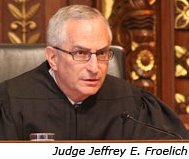8/10/2012
Ohio Cops May Not Prevent a Call of NatureSecond highest court in Ohio overturns conviction because traffic cop refused to give motorist a bathroom break.

The Ohio Court of Appeals late last month overturned a man's conviction for public indecency after police refused to allow him to use the restroom during an overly long traffic stop. On March 7, 2011, Springfield Police Officer William Evan pulled over a car that passed that had a stuck horn which blew continuously. Robert S. Wilcox was a drunk passenger in the vehicle. During the stop, he refused to identify himself to the officers.
This annoyed the patrolmen who ordered him out of the vehicle for a frisking. Wilcox did finally give them his name and asked urgently for permission to use the nearest restroom, which was five blocks away at a gas station. The police refused. Wilcox was told he was not under arrest but that he needed to sit inside the stopped vehicle. Wilcox could not hold it.
While the officers were busy writing up citations for the driver, Wilcox relieved himself on the grass next to the car. Officers then arrested him for public indecency. In the process of a search, he was found to be carrying cocaine and heroin. At trial, a Clark County Court of Common Pleas judge sided with Wilcox.
"He was not committing acts, but rather responding to a natural biological function, for which, under his intoxicated condition, he had diminished capacity to control and under circumstances which were acerbated by the refusal of the officers to allow him to leave to find a more appropriate facility, even though there were no facts justifying the defendant's further detention," the lower court wrote.
Prosecutors appealed, insisting the officers did nothing wrong. A three-judge panel ruled instead that it was Wilcox who had been treated improperly.
"A passenger, unlike the driver of a vehicle, is not legally obligated to carry identification or to produce it for a police officer," Judge Jeffrey E. Froelich wrote for the appellate panel. "An officer making a traffic stop may order passengers to get out of the car pending completion of the stop due to the added danger to an officer when a passenger is present and the minimal additional intrusion on the passenger.
The appeals court found that there was no reason to suspect Wilcox had been engaged in illegal activity.
"While the officers acted lawfully in stopping the car and asking basic questions of Wilcox, the passenger, they violated his constitutional rights when they insisted that he remain in the car or at the scene of the traffic stop while the driver's citation was issued," Froelich wrote. "When the police determined that Wilcox would not be allowed to drive the stopped vehicle, they had no basis to keep him at the scene while the citation of the driver was completed. Wilcox should have been allowed to walk away from the scene when he expressed a need to do so."
Because the arrest was illegal, the court suppressed the drug evidence and upheld the trial court's ruling. A copy of the appellate decision is available in a 50k PDF file at the source link below.


